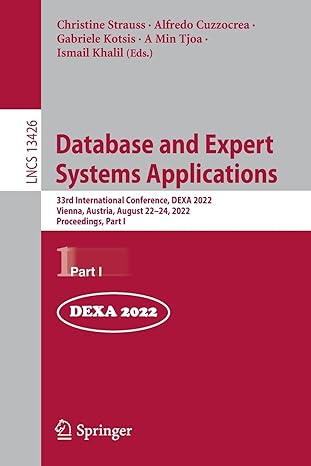Question
(+5)Ask the user for a string and creates the following dictionary: The values are the letters in the string, with the corresponding key being the
(+5)Ask the user for a string and creates the following dictionary: The values are the letters in the string, with the corresponding key being the place in the string. For example if the user entered the string CSC120 then create the dictionary d
d = {'0':'C', 1:'S', 2:'C', 3:'1', 4:'2', 5:'0'}
(+5) Display the length of the dictionary d using a len function In this case the answer is 6
(+5) Ask the user for a key(integer). If the key is in the dictionary display the corresponding value. As an example if the user entered 2 display C if the user entered a key that was not in the dictionary display Error key not found
(+5) Ask the user for a value (one of the characters in our example). If the value is in the dictionary display Value found otherwise display Value not found. As an example if the user entered C display Value found
(+5) Ask the user for a character and add it to the dictionary. As an example, if the user enters X then the key should be the next key integer (in this case 6 but in general it should be related to the length of the dictionary ) For this example
d = {'0':'C', 1:'S', 2:'C', 3:'1', 4:'2', 5:'0', 6:X}
see the code to add the name Hopper to the dictionary in the Lab09Template code below
Display the dictionary
(+15) Ask the user for a string of digits, separated by a comma. Print out the corresponding values for those digits.
For example if the user enters the string 0, 1, 4 then print out CS2 At issue is how to handle digits that exceed the range of key values for example, in our case, any digits in the range 05 should generate a corresponding value but any digit(s) > 5 OR < 0 has to be handled appropriately -- I leave that to your decision ( generate an error message or ignore the values) See the last part of the Lab09 template code for an example, on how to handle the string 11, 0, 2 (11 is not a key)
#lab09Template.py names = { 10:"Euclid", 20:"Archimedes", 30:"Newton", 40:"Descartes", 50:"Fermat", 60:"Turing", 70:"Euler", 80:"Einstein", 90:"Boole", 100:"Fibonacci", 110:"Nash" } print("1 ",names.keys()) # print keys print("2 ", names.values() ) # insert Hopper with a key == 120 names[120] = "Hopper" print("3 names == ", names) print(' the length of names is ', len(names) ) #use in operator to search for keys as well as non-existence keys print('searching...') key = 110 if key in names.keys(): print("4 key == ", key, ' value == ',names[key]) else: print("error key == ', key") s = "Euler" # search for Euler if s in names.values(): print(" 5 value ", s," found ") else: print("NO ", s) print("====ALL KEYS====") for key in names: print(key, names[key]) print("==== ALL VALUES====") for values in names.values(): print(values) print("====string manipulation====") # isolating individuals integers using the split() and int() functions s = (input("Enter several integers separated by a comma ")) # NOTE cannot convert 110,20,3 into an integer directly print(' 6 s ==' , s) s = s.split(',') # now split using , as a separator, into individual words print('7 using the split function ',s, 'length == ', len(s) ) # still a string but separated into words # now convert position 0 in the string to an integers print(' 8 int (s[0]) == ', int(s[0]) ) # now print it if int(s[0] ) in names.keys(): # check if the keys values print("9 key found == ", key, ' value == ',names[key]) else: print('ERROR key == ', int(s[0]), 'NOT in key range ') # now the second .... we may need a loop for this !!!!!! x = int(s[1]) # now convert position 1 to a string print('10 x == ', x) # now print it # we need to check if int(s[1]) is with th range of key values if x in names.keys(): print("11 key found == ", x , ' value == ',names[x]) else: print('error key == ', int(s[1]), 'NOT in key range ') for i in s: print( i) # displays all the keys check to see in dictionary
3 names =={10: 'Euclid', 20: 'Archimedes', 30: 'Newton', 40: 'Descartes', 50: 'Fermat', 60: 'Turing', 70: 'Euler', 80: 'Einstein', 90: 'Boole', 100: 'Fibonacci', 110: 'Nash', 120: 'Hopper'}
the length of names is12
4 key ==110value ==Nash
5 valueEulerfound
====ALL KEYS====
10 Euclid
20 Archimedes
30 Newton
40 Descartes
50 Fermat
60 Turing
70 Euler
80 Einstein
90 Boole
100 Fibonacci
110 Nash
120 Hopper
==== ALL VALUES====
====string manipulation====
Enter several integers separated by a comma
6 s == 11, 120, 40
7 using the split function['11', ' 120', ' 40'] length ==3
8 int (s[0]) ==11
ERROR key ==11 NOT in key range
10 x ==120
11 key found ==120value ==Hopper
Process finished with exit code 0
Step by Step Solution
There are 3 Steps involved in it
Step: 1

Get Instant Access to Expert-Tailored Solutions
See step-by-step solutions with expert insights and AI powered tools for academic success
Step: 2

Step: 3

Ace Your Homework with AI
Get the answers you need in no time with our AI-driven, step-by-step assistance
Get Started


